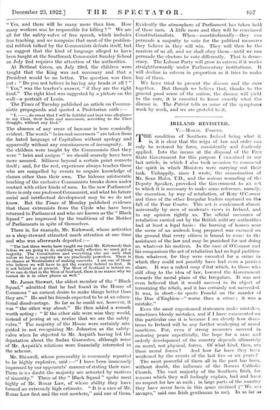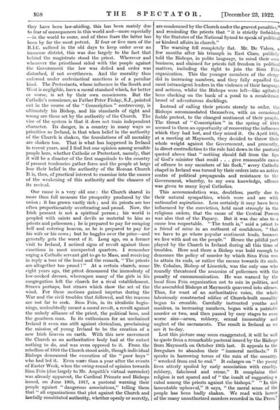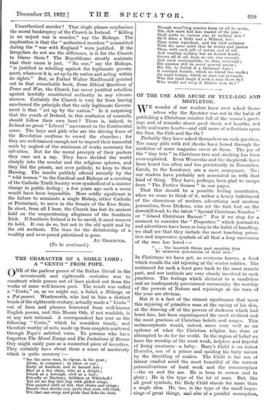IRELAND REVISITED.
V.—MORAL FORCES. THE condition of Southern Ireland being what it is, it is clear that the reign of law and order can only be restored by force, consistently and fearlessly applied. Into the means at the disposal of the Free State Government for this purpose I examined in my last article, in which I also took occasion to commend the spirit in which Ministers were carrying out their task. Unhappily, since I wrote, the assassination of Mr. Sean Hales, T.D., and the serious wounding of the Deputy Speaker, provoked the Government to an aet to which it is necessary to make some reference, namely, the execution, by way of retaliation, of Rory O'Cxmor and three of the other Irregular leaders captured on the fall of the Four Courts. This act is condemned almost universally by men of moderate views in Ireland, and in my opinion rightly so. The official measures of retaliation carried out by the British military authorities had at least a legal basis : the burning of houses near the scene of an ambush long prepared was excused on the ground that every citizen is bound to come to the assistance of the law and may be punished for not doing so, whatever his motives. In the case of O'Connor and his companions the act of retaliation had no legal justifica- tion whatever, for they were executed for a crime in which they could not possibly have had even a passive share. It was a naked coup d'etat which, to those wh still cling to the idea of law, lowered the Government towards the moral plane of the Irregulars. It was not even believed that it would succeed in its object of terrorizing the rebels, and it has certainly not succeeded. It was, in short—to quote Fondle on the murder of the Due d'Enghien—" worse than a crime ; it was a mistake."
Even the most experienced statesmen make mistakes, sometimes bloody mistakes, and if I have commented on this particular one it is because I see clearly how disas- trous to Ireland will be any further weakening of moral sanctions. For, even if strong measures succeed in restoring peace superficially, the hope for a sane and orderly development of the country depends ultimately on moral, not physical, forces. Of what kind, then, are these moral forces ? And how far have they been weakened by the events of the last five or six years ?
The most powerful of them all in the past has been, without doubt, the influence of the Roman Catholic Church. The vast majority of the Southern Irish, for reasons which they will feelingly explain, had and have no respect for law as such ; in large parts of the country they have never been in this sense civilized (" We are savages," said _one Irish gentleman to me). In so far as they have been law-abiding, this has been mainly due to fear of consequences in this world and—more especially —in the world to come, and of these fears the latter has been by far the most potent. If four or five men of the R.I.C. sufficed in the old days to keep order over an immense district, this was due largely to the fact that behind the magistrate stood the priest. Wherever and whenever the priesthood sided with the people against the Government the law was defied and order was disturbed, if not overthrown. And the morality thus enforced under ecclesiastical sanctions is of a peculiar kind. The Protestants, whose influence in the South and West is negligible, have a moral standard which, for better or worse, is set by their own consciences. But the Catholic's conscience, as Father Peter Finlay, S.J., pointed out in the course of the " Conscription " controversy, is ultimately his Bishop, and his standards of right and wrong are those set by the authority of the Church. The vice of the system is that it does not train independent character. Its danger, in a country in many ways so primitive as Ireland, is that when belief in the authority of the Church is shaken, the foundations of all morality are shaken too. That is what has happened in Ireland in recent years, and I find but one opinion among sensible people here, whether Catholic or Protestant, namely, that it will be a disaster of the first magnitude to the country if present tendencies gather force and the people at large lose their belief in the authority of the Roman Church It is, then, of practical interest to examine into the causes of the weakening of this authority and the chances of its revival.
One cause is a very old one : the Church shared in more than full measure the prosperity produced by the union ; it has grown vastly rich ; and its priests are too often proportionately overbearing and proud. Now, the Irish peasant is not a spiritual person ; his world is peopled with saints and devils as material to him as priests and policemen ; he is prepared to pay for escaping hell and entering heaven, as he is prepared to pay for his wife or his cows ; but he haggles over the price—and generally gets the worst of it. Long ago, on a former visit to Ireland, I noticed signs of revolt against these exactions in most unexpected quarters. I remember urging a Catholic servant girl to go to Mass, and receiving in reply a toss of the head and the remark, " The priests are altogether too proud 1 " At a certain church, some eight years ago, the priest denounced the immodesty of low-necked dresses, whereupon many of the girls in his congregation left the church for a rival establishment. Straws perhaps, but straws which show the set of the wind. For these motions gained impetus during the War and the civil troubles that followed, and the reasons are not far to seek. Sinn Fein, in its idealistic begin- nings, undoubtedly meant a moral revolt, a revolt against the unholy alliance of the priest, the political boss, and the gombeen man. In its enthusiasm for an unchained Ireland it even ran atilt against clericalism, proclaiming the mission of young Ireland to be the creation of a new Irish heaven on earth. With this new movement the Church as an authoritative body had at the outset nothing to do, and was even opposed to it. From the rebellion of 1916 the Church stood aside, though individual Bishops denounced the execution of the " poor boys " who had led it. Even more than a year after the events of Easter Week, when the swing-round of opinion towards Sinn Fein (due largely to Mr. Asquith's virtual surrender) was already apparent, the Cardinal Primate and Bishops issued, on June 19th, 1917, a pastoral warning their people against " dangerous associations," telling them that " all organizations that plot against the Church and lawfully constituted authority, whether openly or secretly, are condemned by the Church under the gravest penalties," and reminding the priests that " it is strictly forbidden by the Statutes of the National Synod to speak of political or kindred affairs in church."
The warning fell completely flat. Mr. De Valera, a few months after his triumph in East Clare, publicly told the Bishops, in polite language, to mind their own business, and claimed for priests full freedom in political matters, including the right to join the Sinn Fein organization. This the younger members of the clergy did in increasing numbers, and they fully equalled the most intransigent leaders in the violence of their language and actions, whilst the Bishops were left—like agitated hens clucking on the bank of a pond to a recalcitrant brood of adventurous ducklings.
Instead of calling their priests sternly to order, the Bishops accommodated themselves, with an occasional feeble protest, to the changed sentiment of their people. The threat of " Conscription " in the spring of 1918 seemed to them an opportunity of recovering the influence which they had lost, and they seized it. On April 18th, at a meeting at Maynooth, they decided to throw their whole weight against the Government, and presently, in direct contradiction to the rule laid down in the pastoral quoted above that " nothing should fall from the lips of God's minister that could . . . give reasonable cause of offence to any members of his flock," every Catholic chapel in Ireland was turned by their orders into an active centre of political propaganda and resistance to the Government, whereby, to my own knowledge, offence was given to many loyal Catholics.
This accommodation was, doubtless, partly due to their natural sympathies, which were and are with nationalist aspirations. Less certainly it may have been influenced by the conviction, held most strongly in the religious orders, that the cause of the Central Powers was also that of the Papacy. But it was due also to a cause less respectable. " The truth is," said a priest to a friend of mine in an outburst of confidence, " that we have to go where popular sentiment leads, because we live with and on the people." Hence the pitiful part played by the Church in Ireland during all this time of troubles. Here and there a Bishop was bold enough to denounce the policy of murder by which Sinn Fein was to attain its ends, or rather the means towards its ends. Dr. Cohalan, Bishop of Limerick, was the only one who roundly threatened the assassins of policemen with the penalty of excommunication. He was warned by the local Sinn Fein organization not to mix in politics, and the assembled Bishops at Maynooth quavered into silence. Thus, for want of an authoritative voice, the whole laboriously constructed edifice of Church-built morality began to crumble. Carefully instructed youths and maidens, in increasing numbers, began with a patriotic murder or two, and then passed by easy stages to even worse sins—arson, robbery, sexual immorality and neglect of the sacraments. The result is Ireland as we see it to-day.
Lest this picture may seem exaggerated, it will be well to quote from a remarkable pastoral issued by the Bishops from Maynooth on October 10th last. It appeals to the Irregulars to abandon their " immoral methods." It speaks in harrowing terms of the ruin of the country, " wrecked from end to end." It enlarges on " the young lives utterly spoiled by early association with cruelty, robbery, falsehood and crime." It complains that religion is not spared and of " the insult of suggesting a cabal among the priests against the bishops." " In this lamentable upheaval," it says, " the moral sense of the people has been badly shaken. We read with horror of the many unauthorized murders recorded in the Press."• Unauthorized murder I That single phrase emphasizes the moral bankruptcy of the Church in Ireland. " Killing in an unjust war is murder," say the Bishops. The implication is that the " authorized murders " committed during the " war with England " were justified. If the Irregulars do not see the difference, is it for the Church to blame them ? The Republicans stoutly maintain that their cause is just. " No one," say the Bishops, " is justified in rebelling against the legitimate govern- ment, whatever it is, set up by the nation and acting within its rights." But, as Father Walter MacDonald pointed out in that remarkable book, Some Ethical Questions of Peace and War, the Church has never justified rebellion against lawfully constituted authority in any circum- stances. Certainly the Church is very far from having sanctioned the principle that the only legitimate Govern- ment is that " set up by the nation." Is it surprising that the youth of Ireland, in this confusion of counsels, should follow their own bent ? There is, indeed, in Ireland no great " Liberal " movement in the Continental sense. The boys and girls who are the driving force of the Revolution continue to crowd the churches ; for they are well-trained enough not to imperil their immortal souls by neglect of the minimum of works necessary for salvation. But for the moral precepts of their pastors they care not a rap. They have divided the world sharply into the secular and the religious spheres, and they bid the priests, not over politely, to keep to their Massing. The insults publicly offered recently by the " wild women " to the Cardinal and Bishops at a meeting of the Catholic Truth Society were symbolical of a sinister change in public feeling ; a few years ago such a scene would have been impossible. More coldly significant is the failure to nominate a single Bishop, either Catholic or Protestant, to serve in the Senate of the Free State. In short, from all I hear, the Church has lost its ancient hold on the unquestioning allegiance of the Southern Irish. If Southern Ireland is to be saved, it must recover its hold. It can do so, but not in the old spirit and by the old methods. The time for the dictatorship of a wealthy and over-proud priesthood is gone.
(To be continued.) AN OBSERVER.












































 Previous page
Previous page